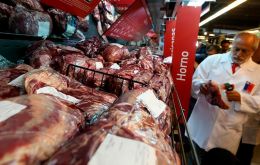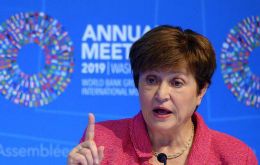MercoPress. South Atlantic News Agency
Tag: Inflation
-
Tuesday, March 29th 2022 - 23:22 UTC
IDB: Ukraine war should open windows for Brazil, Argentine and LatAm

The Inter-American Development Bank (IDB) said Monday that Russia's invasion of Ukraine and the threat it poses to food security may be an opportunity for large Latin American exporters, such as Argentina and Brazil due to the disruption in the global supply chains.
-
Wednesday, March 23rd 2022 - 09:22 UTC
Forum of Brazilian Governors agrees on tax freezing to curb inflation

A forum of Brazilian Governors Tuesday agreed to extend for another 90 days the freeze on the average Tax on Merchandise Circulation (ICMS) that is levied on gasoline, ethanol and cooking gas to help mitigate inflation's impact on the citizenry's purchasing power, it was announced.
-
Saturday, March 19th 2022 - 09:40 UTC
Argentine President announces measures to curb inflation

Argentine President Alberto Fernández Friday announced through a recorded message from the Olivos Residence the creation of a “stabilization fund.” The head of state's words came on the day he had promised the fight against inflation would begin.
-
Wednesday, March 16th 2022 - 09:55 UTC
Argentina's inflation for February of 2022 reaches 4.7%

Argentina's inflation for the month of February of 2022 has reached 4.7% on average, the National Institute of Statistics and Census (Indec) announced Tuesday. It was the highest percentage since March of last year and was driven chiefly by increases in the price of food due to droughts, heatwaves, and fires.
-
Friday, March 11th 2022 - 21:44 UTC
Shortage of affordable groceries reported in Argentina

Shortages of basic products at Argentine supermarkets have been reported Friday, particularly of flour, cooking oil, and dry noodles of the most affordable brands. Media coverage has also outlined a sharp increase in the price of eggs.
-
Thursday, March 10th 2022 - 19:51 UTC
February inflation in Chile moderates but still high; beware of consequences of the Russia/Ukraine war

Inflation in Chile during February climbed 0,3%, well below market expectations, but still 7,8% in the last twelve months, the highest recorded since November 2008. The release was done by the country's stats institute, INE, and was indeed a positive announcement given the private estimates (0,6% and 0,7%) and the fact that inflation was effectively surging, 1,2% in January.
-
Saturday, February 26th 2022 - 09:20 UTC
US inflation in January at a four decades high, and still has to peak

No peace for president Joe Biden absorbed by the Ukraine war, and for US consumers, inflation keeps surging and is expected to peak sometime midyear, before it begins to weaken. An inflation gauge closely monitored by the Federal Reserve effectively jumped 6.1% in January compared with a year ago.
-
Monday, February 21st 2022 - 09:21 UTC
IMF's Kristalina Georgieva: “We must fight inflation without impairing the recovery”

International Monetary Fund Managing Director Kristalina Georgieva made the following statement at the virtual meeting of the G20 Finance Ministers and Central Bank Governors:
-
Thursday, February 17th 2022 - 10:12 UTC
Patagonia January inflation 3,6%, double the Falklands' annual retail prices index

Despite highly subsidized public rates, a long list of coerced consumer prices, relatively cheap fuel in the current global energy-short environment, the Consumer Price Index in Argentine Patagonia, mainly Tierra del Fuego, reached 3,6% in January, according to the latest report from the official stats office, Indec.
-
Wednesday, February 16th 2022 - 09:46 UTC
Argentina's inflation reaches 3.9% in January

Despite requirements from the International Monetary Fund (IMF) that inflation needs to be under control, Argentina's National Institute of Statistics and Censuses (Indec) Tuesday reported January's figures had reached 3.9% for a 50.7% YoY.
